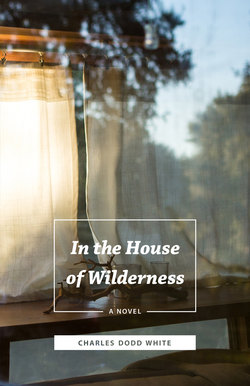Читать книгу In the House of Wilderness - Charles Dodd White - Страница 16
На сайте Литреса книга снята с продажи.
Оглавление8
THE HOUSE was overturned the evening he got back. He did not realize the extent of the damage until he had walked to the kitchen and seen the back window smashed. The office next: the liquor stolen and the drawers deprived of their contents. A few small things pointlessly broken. Overall, a kind of violence for its own sake, as far as he could tell. The spite and meanness of vandals. He added the expenses of the damage in his head, wasn’t concerned until he thought to check upstairs.
He went up and saw that the bedcovers had been stripped, the pistol taken. He removed his telephone from his trouser pocket, considered calling the sheriff’s office, then Josh, but put it on the nightstand without punching the numbers.
He stood at the opening of the crawlspace. He thought he heard something down there and went back inside for a flashlight. He circled around the opposite side, practiced what he imagined to be stealth, though his pulse hammered a disco beat in his temples and he was unsure how covert his approach really was. The light showed a pale nothing until it found the far wedge of foundation and banked earth. There, a pair of iridescent eyes and the pale snout of a possum. Stratton switched off the beam, left the creature alone.
After picking up the tines of broken glass on the back porch, he sealed the window with flattened cardboard and duct tape. He went through the house once more before checking the locks and taking a beer with him to bed. Though not expecting to find sleep, he went down fast and remained in bed well past daylight.
While he drank coffee the next morning he made notes for repairs in a small moleskin ledger. It was a book he’d kept for some time, a kind of diary that he’d never managed to use regularly. Instead, it had become a convenient volume of bound scrap paper, practical bits of life encroaching on more abstract concerns. The disagreement of his inner and outer lives made into a more complete disagreement and held in the insufficient shape of a book.
He drove into town and then out to the Lowe’s, picked up the boxed window panes, the measured and sawed length of sill molding, some touch-up paint. Once he had it stowed in the back he locked it up and stepped across the street to Wiley’s Lounge on the river.
It was a slumping horror of a place with green indoor-outdoor carpeting over a tumored floor. God knew what crimes lay beneath it. Stratton preferred to press that thought to the back of his mind, along with his faith in the building’s overall structural integrity. Every time he took a step he braced for the inevitable soft give beneath his feet, the feeling of proximity to infection. It was hot inside, sun pouring through the riverside picture window; the bar-top box fan was a negligible comfort. Buck Wiley stood at the far end of the press-wood bar, drinking coffee from a big Darth Vader mug that said I’M YOUR DADDY. He had a birthmark shaped like a country on the right side of his face.
“The regular?”
“You got it.”
Wiley went down to a small black cooler and pulled out some pre-mixed Bloody Mary mix, poured a shot glass’s worth into a pint glass, cracked an egg after that, filled it to the top with beer from the tap and stirred it once with a long spoon. The egg yolk circled like a small sun.
“Run a tab?”
Stratton answered with a thumbs-up and lifted the drink to his lips. He watched the run of the river out the window for a while. High and hectic amongst some rocks before a quick wash down to where the channel ran deep and the current braked. The waters ran down through town and then on to Knoxville where it fed into the Tennessee. Men had come in flat-bottomed boats long ago, come from as far as New Orleans to find this notch in the green hill country. More to prove that it could be done than for any sustainable interest of commerce. The sheer taunt of difficulty compelling them even when the reliable principle of greed failed. Something about this place turned up the dregs of other places, brought a kind of person here that had nowhere else to claim a hold on life. There were other geographies like that, Stratton knew, had known more than a few of them in his own life, but this was the one he lived in and he knew that so much of his life now belonged to this river and what it brought in its long ancient slide. It didn’t matter if one came from upstream or down, only that one was confined to perpetual waters that drained the land of its surplus. Men caught in the shedding of what should not be contained.
